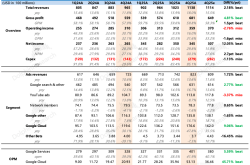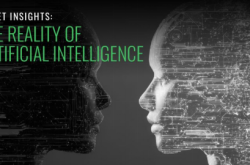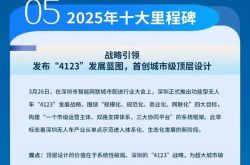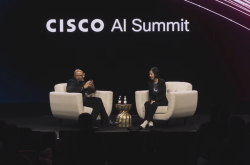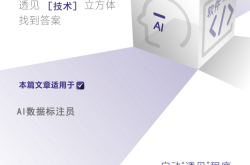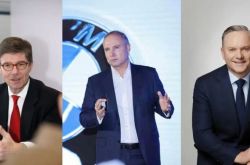If Masayoshi Son Doesn't Act Swiftly, OpenAI May Abandon the Partnership
![]() 08/14 2025
08/14 2025
![]() 660
660
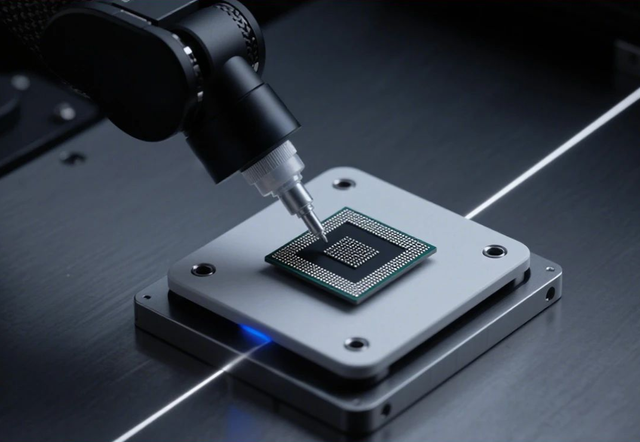
Source: Byte
Sometimes, Masayoshi Son feels his age catching up with him.
In the spotlight of the shareholders' meeting in June 2023, he spoke not with authority, but of "sadness" and "shame." He reflected on his terrible investments and astronomical losses, hinting at a rare moment of self-doubt as he pondered the "remaining time as a businessman."
The shareholders watched the 66-year-old, their emotions a complex mix. This was Masayoshi Son, seemingly prepared to confront failure head-on.
Two years later, in August 2025, in Ohio, USA, the narrative took a dramatic turn. A factory promising "American renaissance" welcomed a mysterious buyer named "Crescent Dune LLC," registered just 12 days prior. It acquired Foxconn's electric vehicle factory in Ohio for $375 million.
This mysterious buyer was none other than Masayoshi Son, who two years earlier was still "grieving in vain."
Masayoshi Son wasn't there to clean up; he was there to embark on an even riskier gamble. This factory would transform into an AI server production base, the linchpin of his "Star Gate" plan in collaboration with OpenAI and Oracle.
From introspection in a Tokyo conference room to the dusty factory floor in Ohio, it was just over two years. What transpired during this period? What propelled a seemingly retreating business tycoon to wage an ultimate battle risking his entire reputation?
01
NVIDIA: The Unavoidable Giant
Masayoshi Son envisions a future world of "Artificial Super Intelligence" (ASI), a realm crafted from code, chips, and boundless computing power. He has proclaimed to the world: ASI will emerge in 2035, with wisdom 10,000 times that of humans.
SoftBank must become the "number one platform provider" in this new era.
At the latest shareholders' meeting, Masayoshi Son recounted a story from his youth. At 17, seeing the intricate circuits of a chip, he had a bold thought: "One day, this thing will surpass the human brain."
For this future, he sketched an astonishingly ambitious blueprint. "Star Gate" serves as the cornerstone, aiming to establish a nationwide data center network in the United States, an infrastructure capable of supporting the entire AI civilization.
In January 2025, when Trump announced this plan with fanfare, Masayoshi Son stood beside him, promising the White House that SoftBank would invest heavily and create tens of thousands of jobs.
The acquisition of Foxconn's Lordstown factory marked the first tangible step toward realizing this grand plan.
In Masayoshi Son's view, "Star Gate" is no longer a mere concept on a PPT.
At the heart of this blueprint lies Arm, cherished by Masayoshi Son like a jewel. In 2016, SoftBank acquired the British chip design company for $32 billion. Today, Arm virtually monopolizes the global mobile chip design market, with a market value that once exceeded $150 billion. SoftBank holds a 90% stake, but that's not enough; Masayoshi Son aims for Arm to break free from mobile phones and enter data centers, directly competing with NVIDIA, the undisputed king of AI chips.
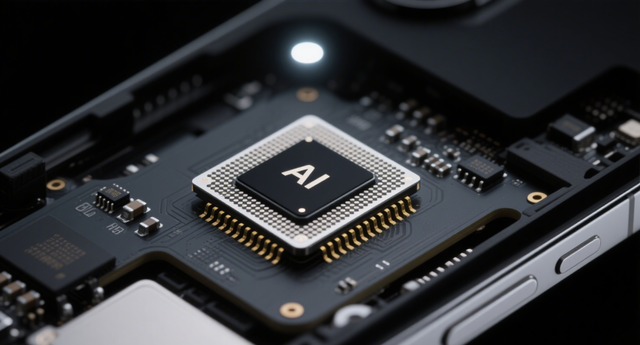
AI chip concept illustration | Made by Byte
Amidst the WeWork and Uber debacles, it was Arm's stellar performance that upheld Masayoshi Son's dignity. Without Arm, Masayoshi Son would scarcely have had a foothold in the AI field. AI chips encompass more than just NVIDIA's GPUs; they also necessitate a plethora of energy-efficient CPUs and custom processors, and Arm's low-power architecture perfectly fits the bill.
To bolster Arm, Masayoshi Son has relentlessly sought allies. In March 2025, he acquired Ampere, another American chip design company, for $6.5 billion. He also has his eyes set on Graphcore, a UK-based AI chip unicorn.
Masayoshi Son's plan is clear: leverage Arm's IP, Ampere's CPUs, and Graphcore's AI accelerators to construct a hardware ecosystem that can challenge the "NVIDIA + CUDA" system.
At the pinnacle of this ecosystem lies a deep partnership with OpenAI. SoftBank has pledged up to $40 billion in investment in OpenAI in exchange for priority access to its most advanced AI models.
Hardware defines algorithms, and algorithms optimize hardware. A perfect closed loop appears to be forming.
Yet, whenever Masayoshi Son discusses his vision for a chip empire, a "ghost" looms in the background.
The name of this "ghost" is NVIDIA, an obsession for Masayoshi Son.
Flashback to 2019, when SoftBank decided to liquidate its 4.9% stake in NVIDIA. At the time, this deal yielded good returns for SoftBank and was hailed as a masterstroke in the investment world.
No one could have anticipated the subsequent narrative. The AI wave swept the globe, and NVIDIA's stock price soared, its market value skyrocketing from hundreds of billions to $4 trillion, becoming the linchpin of the global tech industry.
What SoftBank missed was an opportunity worth over $200 billion, a fact deeply regretted by Masayoshi Son.
How painful was this mistake?
In November 2024, at a summit in Japan, NVIDIA CEO Jensen Huang semi-jokingly remarked to Masayoshi Son in front of thousands of attendees: "Masa (Masayoshi Son's nickname) was once one of NVIDIA's largest shareholders."
After saying that, Jensen Huang mimicked a gesture of "holding his head and crying."
Amidst an atmosphere of unspoken understanding, Masayoshi Son paused and added: "It's okay, we can cry together."
This $10 billion joke seemingly instantly conveyed to the outside world Masayoshi Son's current obsession with AI. His lavish acquisitions of chip companies and support for Arm to challenge the incumbent leader resemble a belated, obsessive self-redemption.
It seems he aims to personally recreate a "NVIDIA." To prove that his vision was correct all along, it was merely fate playing a cruel joke on him.
02
The Gambler's Method Fails
Masayoshi Son's success stems from a methodology he has adhered to for decades.
He calls it the "Time Machine Theory" – observing mature business models in developed markets like the United States and replicating them in markets like Japan and China. The execution of this theory is renowned for its simplicity and brute force: deploying massive capital to invest in the most promising founders he encounters.
Yes, he seeks out so-called entrepreneurial "madmen."
In 1999, he met Jack Ma, then relatively unknown. After only 5 minutes, he decided to invest $20 million. He later recounted: "I saw the charm of a leader in his eyes, perhaps you could say it was an animal-like scent." He believed that if Jack Ma gave an order, his subordinates would even rush into the fire.
Judging by Alibaba's subsequent growth trajectory, Jack Ma was indeed an entrepreneurial "madman."
This methodology created miracles in the lawless era of the internet. Alibaba's success brought SoftBank returns of over a thousand times and propelled Masayoshi Son to the pedestal, making him the venture capital godfather who could turn base metal into gold. Since then, his "Vision Fund" has reached a scale of up to $100 billion, searching globally for the next Alibaba.
He would ask the founders he selected: "If money is not an issue, what would you do?" He would even threaten them: "If you don't accept my investment, I'll throw money at your competitors."
Masayoshi Son would encourage entrepreneurs to become even crazier. When investing in the coworking company WeWork, he told founder Adam Neumann: "In a battle, madmen are more likely to win than smart people."
But this time, the methodology failed.
Neumann indeed became increasingly "crazy." He indulged in marijuana and tequila, using company funds for private jets and lavish parties. At the critical moment of preparing for the IPO, he was surfing in the Maldives, leaving a group of New York executives waiting in vain.
Ultimately, WeWork's IPO was a disaster, with its valuation plummeting from a peak of $47 billion. SoftBank's nearly $19 billion investment was almost a complete loss.
The "madman" that Masayoshi Son personally nurtured ultimately imploded on him.
If the failure of WeWork was the bitter fruit of Masayoshi Son's excessive catalyzation of "madman"-like ambition, then the collapse of another unicorn revealed an even stranger, almost absurd fraud.
The protagonist of this story is Builder.ai, a company founded by Indian serial entrepreneur Sachin Duggal. Just listening to his business plan was almost flawless: six years before ChatGPT's launch, he foresaw how AI would transform business. His core product was a platform claiming to allow non-technical individuals to build applications "as easily as ordering a pizza delivery," with the platform's core being an AI product manager named "Natasha."
SoftBank, led by Masayoshi Son, was the first to invest, followed by renowned institutions such as Microsoft and the Qatar Investment Authority. Builder.ai easily joined the ranks of unicorns with a valuation of $1.5 billion.
But to everyone's surprise, this magnificent edifice built on code had an empty foundation.
When the truth emerged, it was absurd. There wasn't much intelligence behind the so-called AI product manager "Natasha." When users conversed with "Natasha" on the screen, it was actually a team of programmers in India responding to them.
They were clacking away at their keyboards, manually writing code, a "purely human" "artificial intelligence" that fully leveraged India's global dominance in IT outsourcing.
Ultimately, it was financial fraud that brought it down. An internal audit report revealed that the company's claimed annual revenue of $220 million was actually only $55 million, an overstatement of exactly three times. After the fraud was exposed, the company's capital chain broke, and it quickly filed for bankruptcy.
Most ironically, shortly before the company went bankrupt, founder Duggal publicly criticized fraud in the AI field at an industry summit.
"Those investors who write huge checks know little about the potential of artificial intelligence, and they can't tell if it's a scam or not." These words eventually boomeranged back on him and his investors.
As a representative investor, Masayoshi Son became the butt of jokes on the internet.
03
Allies' Chess Games
In Masayoshi Son's blueprint for an AI empire, he is not fighting alone; he is surrounded by a constellation of top figures in the tech world.
They are both allies and opponents on the chessboard.
The most crucial ally is undoubtedly Sam Altman, CEO of OpenAI. Altman's ambition and Masayoshi Son's capital mesh perfectly. One needs trillions of dollars to realize the dream of artificial general intelligence, and the other dares to write a check that no one can refuse.
They stood together at the White House to announce the "Star Gate" plan, with Masayoshi Son even declaring to the world: "I have fully bet on OpenAI."
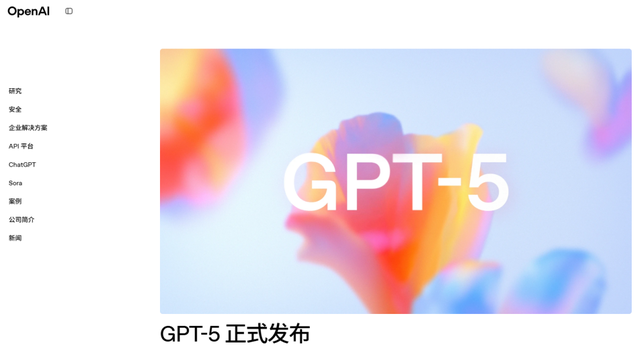
Screenshot from OpenAI's official website
This seems like an unbreakable alliance. SoftBank needs OpenAI's cutting-edge algorithms to infuse its hardware ecosystem with a soul, while OpenAI needs SoftBank's vast capital to support its insatiable appetite for computing power.
But cracks have quietly emerged.
According to The Wall Street Journal, after six months of advancing the "Star Gate" plan, there was almost no tangible progress. One of the core reasons was that SoftBank and OpenAI had been at odds over issues such as the location of data centers. More subtly, OpenAI, desperate for computing power, seemed to have grown impatient.
It privately "bypassed" SoftBank and directly signed a data center agreement with another ally, Oracle, worth up to $30 billion annually.
This move undoubtedly suggests that in this high-stakes game, no one will put all their chips on one person. Even the closest allies are keeping their options open.
If Masayoshi Son doesn't take any substantial action, it will be difficult for him to maintain his voice in "Star Gate." From a hard power perspective, the Arm in his hands is hardly effective in restraining Oracle and OpenAI.
According to multiple sources, the civil engineering work for the first batch of data centers, originally scheduled to start in the second quarter of 2025, has been postponed to early 2026, with the server capacity implementation progress lagging by about 40%. The core reason is that the site selection and renovation of large parks took longer than expected.
Masayoshi Son looked around and found that Foxconn's land was the most suitable.
In recent years, Foxconn's proposed collaborations with automakers in Lordstown have successively failed: Lordstown Motors filed for bankruptcy in June 2023; similarly, IndiEV filed for bankruptcy in October 2023; Fisker entered bankruptcy proceedings in June 2024; the only survivor, Monarch Tractor, only maintains small-batch production of agricultural electric tractors.
Masayoshi Son offered fairly generous terms. Foxconn will continue to operate in the park through leasing or other arrangements, without having to choose between EV and AI, but having the opportunity to form a "composite business model" of shared processes and supply chains in certain links.
After all, outside of this game, there are also a group of unforgiving "critics" watching. The strategic significance of rushing to launch the project is far higher than the minor "cost reduction and efficiency enhancement" that might come from "haggling" with Foxconn.
Tesla CEO Elon Musk is one such critic. He has publicly criticized the "Star Gate" plan more than once, bluntly stating that the plan "lacks actual financial support." Musk's comments directly hit the weakest spot of this grand plan – where will the money come from? $500 billion is an astronomical figure, far exceeding SoftBank's own carrying capacity.
It carries some weight for the richest man in the world to criticize the project for lack of funds.
Masayoshi Son attempted to construct an orderly world with a "super valve" comprised of allies, but the reality is fraught with interest games, practical constraints, and relentless external skepticism.
04
The Ultimate Dream
At 67, Masayoshi Son stands at a pivotal juncture.
During a shareholders' meeting, he acknowledged his age and hinted at succession plans. However, this was more of a posture; his true sentiment was, "I still wish to contribute for some time longer."
He has staked the final leg of his life's journey entirely on the ultimate dream of Artificial Super Intelligence (ASI).
This scenario is eerily familiar.
Rewind to 2000. That year, the dot-com bubble burst, and SoftBank's market value plummeted from a peak of $200 billion to $2 billion in a short span, a 99% decline, pushing the company to the brink of bankruptcy. Masayoshi Son's personal wealth dwindled daily. He briefly surpassed Bill Gates but reigned as the world's richest man for less than three days.
This marked the first "darkest moment" of his life.
Amidst desperation, Masayoshi Son chose not to retreat. He wagered everything on entering Japan's broadband business with "Yahoo BB." To lay the final optical cable, he even stormed government departments, brandishing a lighter and threatening self-immolation in protest.
He vowed that for the company, he would risk his life.
With this ruthless determination and the subsequent miracle of investing in Alibaba, he clawed his way back from the brink of bankruptcy and crafted an even more illustrious legend.
Over two decades later, history seems to be repeating itself. The failure of WeWork and the colossal losses of the Vision Fund have once again plunged SoftBank into crisis. And Masayoshi Son has opted for an even grander and more astonishing gamble, fraught with greater risks.
However, this time, the game he faces is infinitely more complex than in 2000. His adversaries are no longer Japanese telecom operators but heavily armed tech giants like NVIDIA, Google, and Microsoft. The funds he requires are no longer measured in billions but trillions or even tens of trillions.
Moreover, there are "black swans" like Trump, whose actions are unpredictable. Twenty years ago, one could never have envisioned a US president directly and publicly pressuring the CEO of Intel, the CEO of Apple actively "gifting" to appease the US president, or a tech tycoon like Musk visiting the White House to experience a taste of "officialdom".
Once, SoftBank was an investment company that amassed wealth through stocks in Alibaba and Yahoo. But now, Masayoshi Son envisions SoftBank transforming from a "speculator" to an "industrialist." He unequivocally stated, "SoftBank is no longer merely an investor. We will shape the future of AI ourselves."
Fortunately, the capital market remains willing to believe in Masayoshi Son's ALL IN AI strategy. Last week, SoftBank released a quarterly earnings report that surpassed market expectations. In the first quarter (April-June) of fiscal year 2025-2026, the company achieved net revenue of 1.82 trillion yen, a 7% year-on-year increase, exceeding market projections of 1.7 trillion yen. It recorded a pre-tax profit of 689.94 billion yen, a 205.7% year-on-year surge, and a net profit of 421.82 billion yen, turning losses into profits and surpassing market expectations of 158.23 billion yen.
In "Belief: The Masayoshi Son Story" by Atsuo Inoue, Masayoshi Son remarked, "To rank third and die with regrets, I abhor such an outcome."
"I aspire to be number one, and far ahead." This last "tyrant" of the Japanese business world is steering the SoftBank giant ship and hurtling into the uncharted depths of the AI era.
Ahead lies either a new continent with boundless vistas or a colossal vortex that consumes everything.
Can he once again orchestrate a triumphant return, akin to his past feats?
Some images are sourced from the internet. Please inform us if there is any infringement for deletion.

